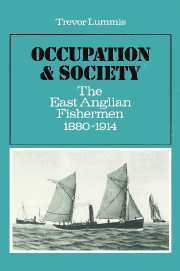Book contents
- Frontmatter
- Contents
- List of figures and tables
- Acknowledgements
- Map
- Introduction
- PART ONE OCCUPATIONAL STRUCTURE
- Introduction
- 1 Inshore
- 2 Trawling
- 3 Drifting
- 4 Working relationships
- PART TWO THE SOCIAL STRUCTURE
- PART THREE THE FAMILY, SOCIAL PRACTICE AND BELIEF
- Appendix: supplementary information on the interviews
- Glossary
- Notes
- Bibliography and sources
- Index
4 - Working relationships
Published online by Cambridge University Press: 22 October 2009
- Frontmatter
- Contents
- List of figures and tables
- Acknowledgements
- Map
- Introduction
- PART ONE OCCUPATIONAL STRUCTURE
- Introduction
- 1 Inshore
- 2 Trawling
- 3 Drifting
- 4 Working relationships
- PART TWO THE SOCIAL STRUCTURE
- PART THREE THE FAMILY, SOCIAL PRACTICE AND BELIEF
- Appendix: supplementary information on the interviews
- Glossary
- Notes
- Bibliography and sources
- Index
Summary
Introduction
Physically and morally, it may be said that we all tread out our lives in the dust of past generations. But of none is this more true than of the working man. Owing to various causes, – frequent revolutions in mechanical processes, displacement of certain forms of industry, changes of domicile and position, emigration, etc., – oral tradition is with them at present singularly short-lived, and the leaders of today will often be ignorant of the labours of his immediate predecessors, even when following in their very footprints.
J.M. Ludlow and L. Jones 1867So far the consideration of working relationships has not proceeded beyond examining the record of conflict. Only in one sub-section did this take the classic form of a union-backed strike against the employers. It is not sufficient, however, to let the analysis rest there. Explaining the absence of conflict is essentially a negative argument in so far as it tends to imply passivity through lack of any stimulus great enough to engender protest. But the interviews reveal that this generation of fishermen were a workforce with an immense amount of industrial pride and a deep identification with their work. Whether this was true of the Yarmouth strikers of 1887 is beyond recall. What is clear is that men who joined the industry only fifteen or twenty years after that strike were unaware that they were treading in the dust of effective union action.
- Type
- Chapter
- Information
- Occupation and SocietyThe East Anglian Fishermen 1880-1914, pp. 50 - 70Publisher: Cambridge University PressPrint publication year: 1985



